Sorry, this entry is only available in Brazilian Portuguese.
Tag: ciência de materiais
B-MRS Newsletter. Year 6, issue 3.
|
|||||||||||||||||||||
|
|||||||||||||||||||||
|
B-MRS presents the Electoral Commission for 2019 elections.
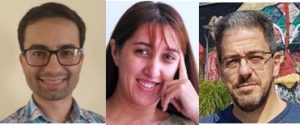
B-MRS is pleased to present the committee responsible for organizing the process that at the end of this year will conclude with the election of the next Executive Board and members of the Council of the society. All active members with paid 2019 annuity will be eligible and may vote.
The members of the Electoral Commission are:
- Prof. Cícero Rafael Cena da Silva (UFMS) .
- Prof. Laura O. Péres (UNIFESP)
- Prof. Marco Cremona (PUC-Rio)
The commission will soon be making available the election calendar and other information on the B-MRS website. The information will be disclosed in B-MRS’s e-newsletter and social media, as well as sent by e-mail to the active members.
The current Executive Board of B-MRS thanks the participation of Professors Cena, Cremona and Péres in the organization of this important process of the Society.
Two more universities participate in B-MRS University Chapters program.
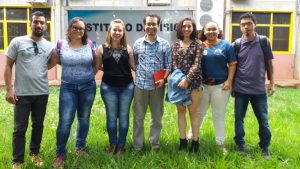
As of March, with the incorporation of a University Chapter (UC) unit at the Federal University of Mato Grosso do Sul (UFMS), Brazil’s five regions are present in the map of the B-MRS’s UCs. In addition, the map of the program gains a new spot in the state of São Paulo, through the participation of a team in the Federal University of São Paulo (UNIFESP), campus of São José dos Campos.
The UCs program, which now has 11 units, brings together undergraduate and graduate student teams from Brazilian universities around complementary activities for academic education.
According to the president of UFMS UC, Gustavo Sander Larios, M.S., the creation of the UC was motivated by the desire to increase interaction among students from different laboratories, departments and research groups. Thus, the team, which is made up of undergraduate, masters and PhD students from the areas of Materials Science, Physics and Chemistry, will stimulate the organization of seminars and scientific meetings involving members of the UC and researchers from B-MRS. “We intend to promote activities that stimulate the development of scientific knowledge, given the national and international research trends, provided through the interaction among the UC members,”adds Larios. The supervisor of this unit is Professor Cícero Rafael Cena da Silva.
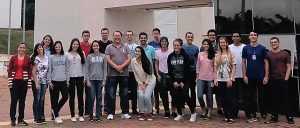
At the UC of the University of São José dos Campos, UNIFESP, the main objective is to disseminate Materials Engineering and Science among university students from all over the Vale do Paraíba region and also in society as a whole, says the master’s Verônica Ribeiro dos Santos, president of the unit, and Professor Manuel Henrique Lente, the supervisor of the UC. The team intends to “divulge the concept of Materials Engineering, since for many it is still unknown, given the great diversity of areas of expertise that the professional in this field is capable of carrying out.” According to Verônica Ribeiro dos Santos and professor Manuel Henrique Lente, the group aspires, in the future, to make their UC an extracurricular source of scientific and technological knowledge and to increase the number of members. Some of the activities the team intends to promote are: seminar cycles involving students and researchers from UNIFESP and other institutions; lectures by representatives of S&T support agencies, class entities, industrial sectors, etc.; technical visits to R&D institutes, companies and incubators; summer courses; dissemination lectures in high schools. In order to carry out the activities, the UC has a comprehensive team of 24 undergraduate students (Bachelor’s degree in Science and Technology, and Materials Engineering), three master’s and one doctoral students (Post-graduation in Materials Science and Engineering, PPGECM), all from UNIFESP.
Get to know B-MRS’s UCs Program and the eleven units it has so far in the states of Mato Grosso do Sul, Minas Gerais, Pará, Pernambuco, Piauí, Rio Grande do Sul and São Paulo: https://www.sbpmat.org.br/en/university-chapters/ucs-da-sbpmat/
B-MRS Newsletter. Year 6, issue 2.
|
|||||||||||||||||||||
|
|||||||||||||||||||||
|
Featured scientist: Juliana Davoglio Estradioto.
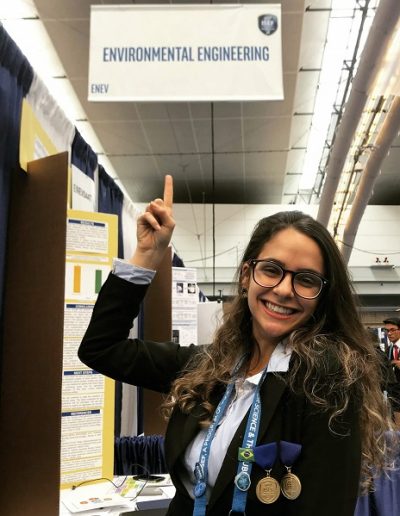
When she was little, Juliana Davoglio Estradioto dreamed of being a singer. Today, at age 18, she has other projects: she will pursue a scientific career. A career she has actually begun. When she was 15, Juliana first came across a scientific article and visited a research laboratory. From that moment, in just three years, she has won dozens of awards in competitions and science fairs (local, regional, national and international) for high school students. Among these distinctions, perhaps the most glamorous one is the one that in December of this year will take her to spend a week in Sweden alongside 24 other young researchers from around the world to attend the 2019 Nobel Prizes ceremony and celebrations in the company of laureates, besides visiting institutions and companies in Sweden and presenting her work to Swedish students.
Juliana was born and raised in Osório, a city of 40 thousand inhabitants, located 100 km from Porto Alegre, in the south of Brazil, surrounded by lakes, mountains and sea. There, in 2015, after finishing primary education in a public school, she enrolled at the Federal Institute of Education, Science and Technology of Rio Grande do Sul (IFRS) – Campus Osório, which had been inaugurated five years earlier, to attend the Technical Course in Administration (secondary education). Created by a law sanctioned in 2008, the Federal Institutes (IFs) are public and free institutions, linked to the Brazilian federal government, that specialize in the provision of professional and technological education from high school to postgraduate level. Extension and research activities are part of the FIs proposal for all levels.
In her first year at IFRS, Juliana was enthusiastic about an extension project aimed at the community of family farmers in the region, with social and environmental bias, coordinated by Professor Flávia Santos Twardowski Pinto. First as a volunteer and later with an IFRS scholarship, Juliana participated in three projects involving research and development over the three years of high school, always guided by Professor Twardowski.
Juliana’s first work resulted not only in the development of biodegradable plastic made from agricultural waste available in the region (passion fruit peel), but also in the creation of an application for this material: a packet for seedlings that does not need to be removed prior to planting. Juliana received several honors for this work, such as 4th place in Environmental Engineering at the largest science competition in the world for high school students, the Intel International Science and Engineering Fair (Intel ISEF) held in Los Angeles (USA) in May of 2017. Another important international recognition was the gold medal obtained at Genius Olympiad, a competition for high school projects addressing environmental problems and their solutions, held in Oswego, USA, in June 2018. At the national level, the main distinction Juliana received was for the work of plastic made of passion fruit– first place in the High School category in the 29th edition of the Young Scientist Award, granted by the National Council for Scientific and Technological Development (CNPq) and partner entities in a ceremony in December of last year, with the presence of the President of the Republic and several other governmental authorities.
At the end of last year, when Juliana graduated from high school in IFRS, she already had a concrete possibility for her undergraduate studies: a scholarship to study at the University of Arizona (USA), received as a prize at Intel ISEF in 2018, for a work she developed on adsorbent materials from agroindustrial residues for the removal of dyes in aqueous suspension. Now, she has at least one more option, since she was approved in the entrance exam for the course of Chemical Engineering of the Brazilian Federal University of Rio Grande do Sul (UFRGS). Will she stay in her homeland? Whatever the decision, the girl’s background makes you think she will be able to take advantage of the opportunities.
See our interview with Juliana.
B-MRS Newsletter: You have just finished High School integrated to Technical Administration. When you enrolled in the course, did you plan to work in the administration area? What led you to participate in scientific research projects?
Juliana Davoglio Estradioto: In order to enter the IFRS – Osório campus, you have to participate in a selective process, and before the process I had to choose between Administration and Informatics. It was very difficult to make that decision at age 14 and I ended up choosing Administration. I never imagined I would do research, much less that it would be on topics so different from what I had seen in the classroom. I find Administration a very important area, but I do not see myself working in the area; now that I am a Technician in Administration, I ended up falling in love with research!
As soon as I joined the course I became very interested in a rural extension project because my family is really involved with the area of agronomy. The coordinator was Professor Flavia and I had to undergo a selection process to enter the project. I remember the 14-year-old teenager who was dying of anxiety, but very excited about being able to do something different from the theoretical classes, since FIs offer a number of opportunities. Soon after, I was being mentored by Professor Flavia and admiring the work she does.
B-MRS Newsletter: Complementing the previous question, how / when did the desire to become a scientist come about? Was participation in the competitions important in this process?
Juliana Davoglio Estradioto: When I was a kid I liked to climb trees, observe insects and stay in touch with nature. However, throughout childhood we learn to be more restrained and our investigative spirit diminishes. So I never had the urge to be a scientist even though I was curious when I was a child. My childhood dream was to be a singer! And so I say that science chose me and not the other way around. I never imagined that it was going to be something I would be so passionate about. When I joined the Federal Institute, I got involved in projects and had a teacher who really encouraged me to follow in that area. Contact with science helped me face a difficult personal moment, made me want to be a better, more determined person, and determined as a scientist. Participation in science fairs was more important in my personal construction and helped in developing my communicative skills and empathy, while interaction in the laboratory and the willingness to do research showed me that I want to do this for the rest of my life.
B-MRS Newsletter: On the development of biodegradable plastic from passion fruit waste, briefly tell us the path taken, from idea to material and application. Have you consulted many scientific articles? Have you exchanged ideas with other researchers? Which labs did you use?
Juliana Davoglio Estradioto: The project of biodegradable plastic from the peel of passion fruit arose from a problem I had observed in my region from the rural extension project I participated in the first year of high school: that the fruit processing industry generates waste, seeing that in the passion fruit the residues correspond to 70% of the fruit. I wanted to bring a use to that peel and Professor Flavia was instrumental in motivating and stimulating me to go after a solution. We talked about ideas for the use of the peel and then I discovered what scientific articles were. It was a frightening because I was 15 years old and had not had any contact with articles until then. Articles are a more academic means of communication and I had to figure out a lot of things before I could read them because my high school classes were basic and management-oriented. I had to learn a lot about Chemistry and Biology before I could understand the articles, I talked to other researchers and consulted my advisor. In the middle of the project development (when it was all going wrong ahahahaha), we found by coincidence that my advisor’s first teacher, Simone Hickmann Flôres, was working with biodegradable plastic films. So, it was possible to use some laboratories from the Institute of Food Science and Technology of the Brazilian Federal University of Rio Grande do Sul to make more complex analyses, while I continued to do the research in the baking laboratory of the Osório campus (the only one available at that time). When I had good plastic samples, I began to question myself about the application I could give the material. And that’s when I remembered the visits to the farmers, where I had seen seedlings wrapped in black plastic (low-density polyethylene). I wanted to replace this material with my biodegradable plastic and it was quite difficult until I got to a packaging for seedlings. The coolest thing of this application is that the packaging can be planted together with the seedling, avoiding waste generation.
B-MRS Newsletter: In 2018 you started working on another project related to the development of a material from agricultural waste, also coordinated by Professor Flavia. Could you summarize what this work is about and its development status?
Juliana Davoglio Estradioto: The project began from the demand of one of the largest agro-exporters of macadamia nut here in Brazil, and nut is on the rise in the world market. Processing the fruit to obtain the nut that is marketed generates an agroindustrial residue which is the macadamia nut bark. This bark is normally intended for landfills or for the combustion and production of energy. What I wanted to do was a biotechnological application, so my hypothesis was whether it would be possible to use the agroindustrial residue of macadamia nut in the synthesis of a polymeric biomembrane. The project is still being developed and improved, I have already been able to prove my hypothesis in a positive way and I am looking to improve the appearance of biomembranes.
B-MRS Newsletter: To what factors and competencies do you attribute the success your work has had in national and international awards?
Juliana Davoglio Estradioto: I believe that my life would be completely different if I had not studied at the Federal Institute of Rio Grande do Sul, because it provides several opportunities that unfortunately are not yet offered in other elementary schools. Being a student of IF and guided by Professor Flavia made my view on education and science to change, I am very grateful for understanding the transformative role they have played in my life and in many other Brazilian realities.
B-MRS Newsletter: Your career in scientific research began with a lot of attention. What are your plans, from a professional point of view, for the next few years or the next decades of your life?
Juliana Davoglio Estradioto: I intend to continue researching in the areas that I am passionate about and to be a scientist, I really like the natural sciences and I believe I will never be able to abandon it. I want to work on themes that focus primarily on sustainability, because we need to find alternatives for the impacts we are causing on all ecosystems. However, besides being a researcher, I intend to work with education and scientific dissemination.
B-MRS Newsletter: When googleing your name, one can guess your life has changed a lot recently. There are many interviews in all types of media, travels, presentations, awards, formalities, congratulations from politicians and admirers … How do you deal with this change?
Juliana Davoglio Estradioto: It is a very positive change and it represents a lot to me at this moment, because I feel responsible for the dissemination of girls doing research in high school. These are activities that give me pleasure and believe we need to encourage other young people so that they see the scientific career as a possibility and an opportunity.
B-MRS invites the scientific community to submit abstracts to the XVIII B-MRS Meeting.
|
||||||||||||||||
|
||||||||||||||||
|
New University Chapter established at UFPE.
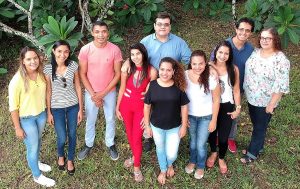
The University Chapters (UCs) program of B-MRS begins 2019 with a new member, the UC of the Brazilian Federal University of Pernambuco (UFPE). With the creation of this unit, the program will have nine UCs distributed in the south, southeast, northeast and north of the country.
The interdisciplinary team of the new UC brings together 15 students (three undergraduate, five masters and seven doctoral students) from courses in Chemistry, Biological Sciences and Materials Science at UFPE. The tutor of the unit is Professor Petrus d’Amorim Santa Cruz Oliveira.
“What motivated us to create our UC was the need to explore the world of Materials Science, reinventing new ways to broaden and bring people from all parts, thus diversifying and strengthening our education more and more,” says Karolyne Santos da Silva, president of the UC. “Our highest expectation is to awaken young people to science, showing that there are possibilities to be innovative and have the opportunity to undergo new experiences with other researchers,” adds the doctoral student in Materials Science.
In the context of B-MRS’s UCs program, the team initially plans to hold a series of events: a holiday course, the 1st Meeting of Materials Science and Engineering of Pernambuco and annual workshops.
Get to know B-MRS’s UCs Program and the nine units it has so far in the states of Minas Gerais, Pará, Pernambuco, Piauí, Rio Grande do Sul and São Paulo: https://www.sbpmat.org.br/en/university-chapters/
B-MRS member is distinguished with the title of Professor Honoris Causa of the Federal University of Ceará.
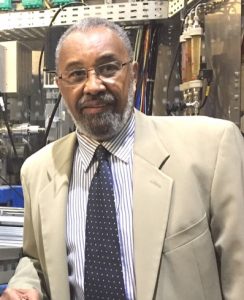
Professor Oswaldo Luiz Alves (IQ – UNICAMP), a member of B-MRS, was awarded the title of Professor Honoris Causa of the Federal University of Ceará (UFC). The title was granted by the University Council of the institution on December 17, 2018. In addition to being a full professor of UNICAMP, Alves has been a collaborating professor of the Graduate Program in Physics of UFC for more than 30 years.
In October 2018, Professor Alves received another important distinction, the admission to the Brazilian National Order of Scientific Merit in the Grand Cross class.
Post-doctoral fellowship at Unesp Rio Claro.
Applications open by January 7, 2019.
More information, here.
